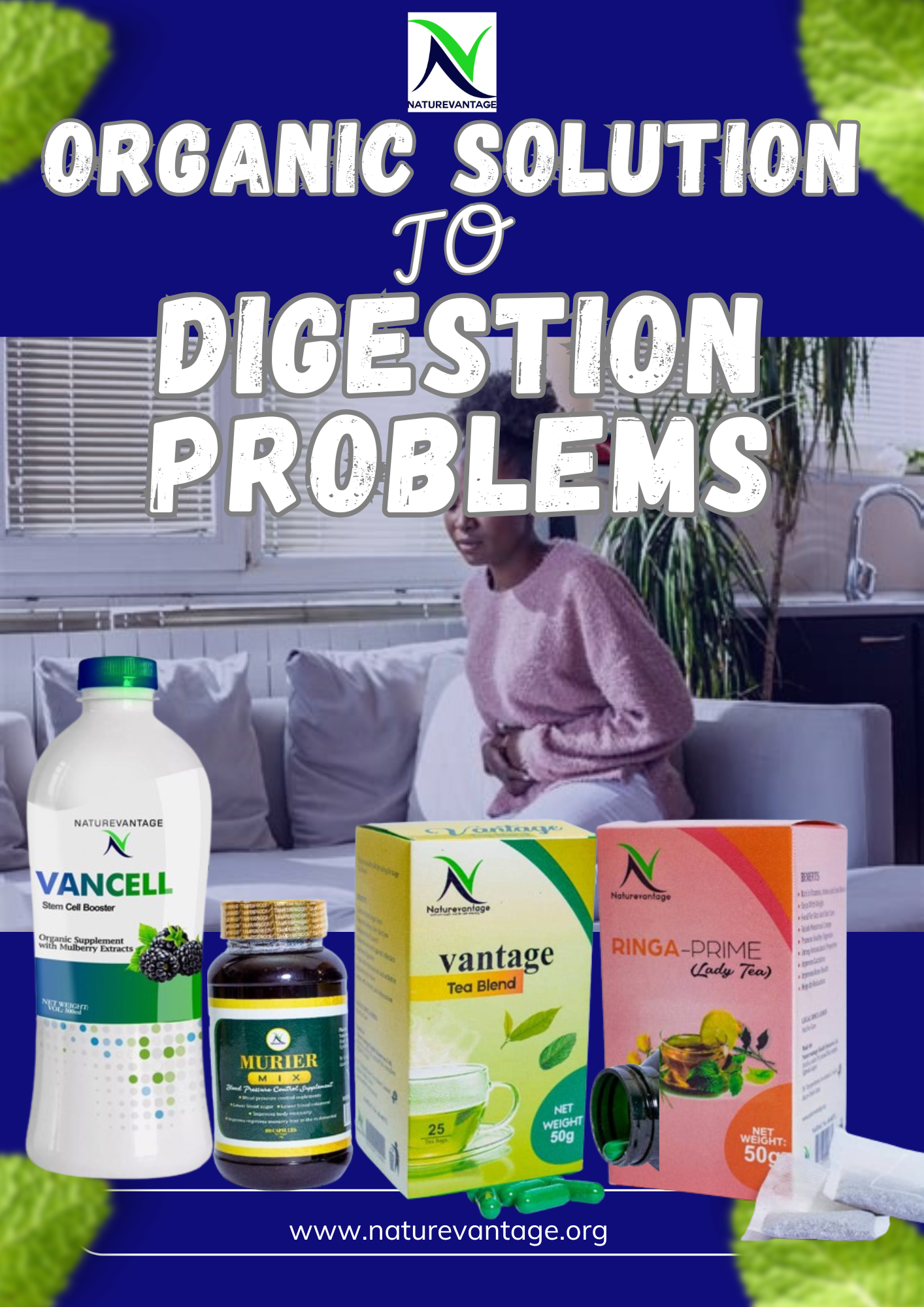Top 6 Common Digestive Problems and Natural Remedy
Digestion is a vital process that converts the food we eat into nutrients and energy, allowing our bodies to function effectively. This complex system involves multiple organs working together to break down food, absorb nutrients, and eliminate waste.
The digestive system is essential to overall health, but it is vulnerable to a wide range of disorders, including heartburn, diarrhea, ulcers, lactose intolerance, celiac disease, and diverticulitis. By understanding how digestion works and recognizing common digestive problems, you can take steps to prevent and manage these issues.
Process of Digestion
The digestive process begins as soon as food enters the mouth and continues until waste is expelled. Each organ in the digestive system plays a specific role in this intricate process.
- Mouth: The Start of Digestion
The digestion process starts in the mouth, where food is broken down mechanically by chewing and chemically by saliva. The enzyme amylase in saliva begins breaking down carbohydrates. The chewed food, now called a bolus, is then swallowed and travels down the esophagus through peristalsis (wave-like muscle contractions). - Esophagus: Transporting Food
The esophagus is a muscular tube that carries food to the stomach. The lower esophageal sphincter (LES) controls the passage of food into the stomach and prevents stomach acid from flowing back up. If the LES doesn’t function properly, it can cause heartburn and acid reflux. - Stomach: Breaking Down Food
In the stomach, food mixes with gastric juices that contain hydrochloric acid (HCl) and pepsin, which begin the breakdown of proteins. The acidic environment also helps kill harmful bacteria. The stomach churns the food into a semi-liquid substance called chyme, which then moves to the small intestine. A weakened stomach lining can lead to ulcers. - Small Intestine: Nutrient Absorption
The small intestine is where most digestion and nutrient absorption occurs. Digestive enzymes from the pancreas and bile from the liver aid in breaking down proteins, fats, and carbohydrates.
Duodenum: The first section, where chyme mixes with digestive enzymes and bile.
Jejunum: The middle part, where most nutrients are absorbed.
Ileum: The final section, which absorbs vitamin B12 and bile acids.
Any disruption in this process can lead to malabsorption, contributing to issues like celiac disease.
- Large Intestine: Water Absorption and Waste Formation
The large intestine absorbs water and electrolytes from undigested food and forms solid waste (feces). Beneficial bacteria in the large intestine help break down certain fibers and produce essential vitamins like B and K. Issues here can result in diarrhea, constipation, or conditions like diverticulitis.
Common Digestive Problems and Their Causes
Digestive disorders are common and can cause discomfort or serious health complications. Here are some of the most prevalent issues:
- Heartburn and Acid Reflux (GERD)
Heartburn is a burning sensation in the chest caused by stomach acid moving into the esophagus. Chronic heartburn can indicate gastroesophageal reflux disease (GERD).
Causes: A weak lower esophageal sphincter (LES), overeating, obesity, spicy or fatty foods, and lying down after meals.
Management: Avoid trigger foods, eat smaller meals, and use over-the-counter medications like antacids or proton pump inhibitors (PPIs).
- Diarrhea
Diarrhea is characterized by frequent, loose, or watery stools. It can be acute or chronic.
Causes: Infections, food intolerances, digestive disorders like IBS, or inflammatory conditions.
Management: Stay hydrated, eat a bland diet (BRAT diet—bananas, rice, applesauce, toast), and avoid high-fiber and greasy foods.
- Peptic Ulcers
Ulcers are sores that form in the stomach or small intestine, often due to Helicobacter pylori infections or prolonged NSAID use.
Symptoms: Burning stomach pain, bloating, nausea, and sometimes vomiting blood.
Management: Treat with antibiotics for H. pylori and use PPIs or H2 blockers to reduce stomach acid.
- Lactose Intolerance
Lactose intolerance occurs when the body lacks lactase, the enzyme needed to break down lactose (the sugar in dairy products). This leads to digestive discomfort after consuming dairy.
Symptoms: Bloating, gas, diarrhea, and abdominal cramps after eating dairy.
Causes: Lactase deficiency, often genetic or age-related.
Management: Avoid dairy products, use lactose-free alternatives, or take lactase supplements.
- Celiac Disease
Celiac disease is an autoimmune disorder triggered by consuming gluten (found in wheat, barley, and rye). It causes damage to the small intestine’s lining, leading to malabsorption of nutrients. Symptoms: Diarrhea, weight loss, fatigue, and anemia.
Management: The only treatment is a lifelong gluten-free diet to allow the intestinal lining to heal.
- Diverticulitis
Diverticulitis occurs when small pouches (diverticula) that form in the walls of the colon become inflamed or infected. This can cause severe digestive discomfort.
Symptoms: Abdominal pain, fever, nausea, and changes in bowel habits.
Causes: A low-fiber diet is a major contributor.
Management: Increase fiber intake, rest, antibiotics for infections, and in severe cases, surgery.
Tips for Maintaining Digestive Health
Here are some practical tips to keep your digestive system healthy:
- Eat a High-Fiber Diet: Fiber promotes healthy digestion by regulating bowel movements and preventing constipation. Include both soluble and insoluble fibers in your diet (found in fruits, vegetables, and whole grains).
- Stay Hydrated: Drink plenty of water to aid digestion and keep stools soft, preventing constipation.
- Exercise Regularly: Physical activity promotes bowel movements and prevents digestive issues like constipation.
- Manage Stress: High stress levels can exacerbate digestive disorders like IBS. Incorporate stress-reduction techniques such as meditation, yoga, or deep breathing.
- Avoid Trigger Foods: Some foods can worsen digestive problems. For example, spicy foods and caffeine can trigger heartburn, while gluten can aggravate celiac disease.
- Eat Smaller, Frequent Meals: Overeating can overwhelm your digestive system, leading to bloating and discomfort. Opt for smaller meals spaced throughout the day.

Benefits of Organic Solutions to Digestion Problems
When it comes to natural remedies for digestive health, organic solutions made from plant-based ingredients can offer significant benefits.
Vancell:
Vancell is formulated with plant-based ingredients rich in antioxidants, designed to support digestive health by protecting the gut lining from oxidative stress and inflammation. It also promotes a healthy metabolism and improves nutrient absorption.
These ingredients work together to:
Provide healthy fats and fiber that ease bowel movements and prevent constipation, while reducing digestive inflammation.
Stimulate bile production, aiding in fat digestion and relieving indigestion, while also supporting liver health.
Offer fiber and antioxidants that enhance regular bowel movements and reduce gut inflammation.
Benefits:
The unique combination of potent plant ingredients in Vancell addresses various digestive issues, including stimulating bile production, enhancing bowel regularity, and shielding the gut from oxidative stress. This makes it a valuable remedy for constipation, indigestion, and promoting overall digestive wellness.
Ringa Prime:
Ringa Prime contains a blend of nutrient-dense, fiber-rich ingredients known for supporting digestion. This powerful formula reduces inflammation, helps with nutrient absorption, and alleviates constipation. Other soothing elements work to calm the digestive tract, relieve bloating, gas, and cramps, and balance gut bacteria for overall digestive harmony. It also relaxes gastrointestinal muscles to reduce discomfort, making it especially beneficial for managing symptoms of IBS and indigestion.
Benefits:
The herbs in Ringa Prime synergistically calm the digestive system, alleviate bloating, and promote smoother bowel function. It’s an ideal choice for those dealing with IBS, bloating, and gas.
Vantage Tea Blend:
Vantage Tea comprises of ingredients known to support digestive health, ease discomfort, and protect the gut from inflammation and oxidative stress. These components help relieve symptoms like indigestion, diarrhea, and bloating. Drinking Vantage Tea can enhance nutrient absorption and promote a healthy gut environment over time.
Benefits:
This tea provides quick relief from digestive discomfort, especially after large meals. It soothes the digestive tract, reduces inflammation, and promotes digestive balance, making it a valuable addition for anyone seeking improved gut health and comfort.
Murier Mix:
Murier Mix combines well-known digestive herbs that stimulate digestion, ease nausea, and reduce bloating and gas. Its components also promote the release of digestive enzymes, helping with indigestion and acid reflux. The blend includes ingredients traditionally used to soothe the stomach lining, reduce irritation, and support ulcer healing.
Benefits:
This organic formula effectively targets digestive concerns like acid reflux, indigestion, and ulcers. It’s especially beneficial for individuals dealing with digestive inflammation or post-meal discomfort, offering long-term relief and support for a healthy digestive system.
Managing digestive problems with Naturevantage’s organic solutions like Vancell, Ringa Prime, Vantage Tea Blend, and Murier Mix is a natural and effective approach to achieving long-term gut health. These products offer a wide range of benefits, from alleviating common symptoms like bloating, indigestion, and constipation, to addressing more serious conditions like ulcers and IBS. For your overall well being, introduce these plant-based remedies into your daily routine, leading to significant improvements in digestive function.













